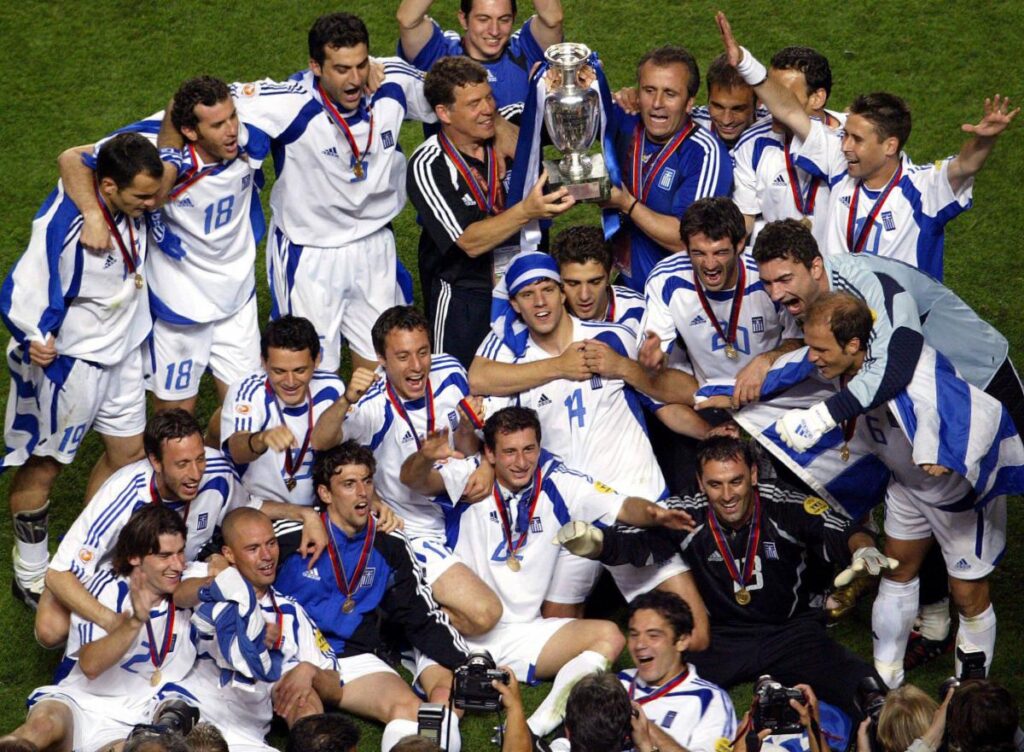May 20, 2022
by Carla Hay

Directed by Christopher André Marks
Greek, German and English with subtitles
Culture Representation: Taking place in Greece and other parts of the world, the documentary film “King Otto” features an all-white group of men who are connected in some way to Greece’s national soccer team of the 2000s.
Culture Clash: German soccer coach Otto Rehhagel, who had success in coaching German professional soccer teams, took a big risk to coach Greece’s national soccer team, which was on a losing streak for decades, to transform the Greek team into underestimated winners.
Culture Audience: “King Otto” will appeal mainly to people who are fans of soccer and underdog sports stories.

You don’t have to be a sports fan to enjoy the documentary “King Otto,” the inspirational story of how German coach Otto Rehhagel transformed Greece’s national soccer team from a group on a losing streak into international champions in the 2000s. It’s also a story of how people can overcome language barriers and cultural differences to succeed in common goals without losing their identities. “King Otto” follows a familiar documentary format for this type of story, but the thrilling archival sports footage and insightful interviews make this movie an engaging watch from start to finish.
Directed by Christopher André Marks, “King Otto” is also just the right length (82 minutes) to tell the story well without being too long or too short. At the center of the interview footage is Rehhagel, who has a compelling way that he shares his memories of how he took the Greek national soccer team from the bottom of the pack to the top of the heap. He was with the Greek team from 2000 to 2010. It’s a story of massive risk-taking and how confidence and the right teamwork can pay off to great rewards.
Most coaches who are at the top of their game with a championship and well-respected track record don’t decide to do an about-face to relocate to another country and coach a losing team. But that’s exactly what Rehhagel (a former soccer player himself) did in 2000, when he began coaching the Greek national soccer team. When Rehhagel took the job offer to coach the Greek team, he was a very famous soccer coach in Germany. He had the nickname King Otto because of his charismatic leadership qualities.
Rehhagel had his greatest success in German soccer as the coach of Werder Bremen from 1981 to 1995. During this time period, Werder Bremen was transformed from a modestly winning team to a powerhouse, winning German championships in 1988 and 1993, as well as the European Cup in 1992. Rehhagel left Werder Bremen to coach rival team Bayern Munich from 1994 to 1995, but it was a tumultuous change that resulted in Rehhagel being fired.
Rehhagel then moved on to manage the German soccer team Kaiserslautern from 1996 to 2000, to mixed results. The team won the German national championship in 1998, but that turned out to be the peak victory for the team under Rehhagel’s leadership. He resigned from Kaiserslautern in 2000. It’s no wonder, under these circumstances, that Rehhagel probably thought it might be good for him to do something radically different. And that’s when he accepted the offer to coach the Greek national soccer team.
In the beginning of “King Otto,” Rehhagel is shown looking around at an empty Panathenaic Stadium in Athens, Greece. In a voiceover, he makes this comment about why Greece appealed to him: “We admire the Greeks for their history. They have given so much to the world. I, as a German, had a special relationship with the Greeks.”
He continues, “And if someone had told me what would happen one day, no one would have believed it. We were outsiders in the entire world of football. But, as Greek history teaches us, the gods always have their own plans.”
Most of Rehhagel’s interview footage is of him in a room literally sitting on a throne, which was probably the “King Otto” filmmakers’ idea, not his. Although Rehhagel’s nickname is King Otto, he doesn’t put on pretentious airs. There are touches of arrogance in his storytelling. However, this pride isn’t so much about himself as it is about the collective pride that he feels about what he was able to accomplish with the team members who were widely underestimated and disrespected in the world of soccer until Rehhagel came along.
Greek National Team president Vassilis Gagatsis was the one who recruited Rehhagel for the job. Gagatsis says in the documentary: “I wanted to hire Rehhagel because I thought [Rehhagel] being a German, he would be able to instill the discipline that we Greeks lack.” Gagatsis describes Greek culture as a lot of partying and procrastination—two words that he said also could describe the Greek National Team at the time.
There were other problems too. Gagatsis remembers, “When I became president, the National Team was like a traveling circus.” By the time Rehhagel joined as the coach, the team still didn’t have its own training center. “The team had to wander around and beg local clubs to let us use their facilities,” adds Gagatsis.
Rehhagel (who was born in 1938) remembers that he was reluctant to take the job at first. For starters, he was in his early 60s, an age range when most people in his line of work are retired or plan to retire within a few years. Second, there was a language barrier, since Rehhagel did not speak Greek, and none of the Greek players spoke German. And third, there was no denying that it was going to be an uphill battle to transform an underfunded, perpetually losing team into winners.
But take the job he did. And it wasn’t easy, because Rehhagel’s strict and intense style clashed with the Greek players being accustomed to a more laid-back way of coaching. Rehhagel also refused to permanently relocate to Greece and maintained his home in Germany in those early years, thereby adding to the perception that he was just a visiting outsider. With tensions rising between the German coach and the Greek team, something had to be done to solve this problem.
Understanding that he couldn’t bridge the gap alone, Rehhagel recruited Ioannis Topalidis, a former soccer player who was fluent in Greek and German, to be Rehhagel’s assistant coach. In the documentary, Topalidis says that in his translations to the team members, he would “sugar coat” Rehhagel’s often-harsh criticisms to the team members. In other words, Topalidis would translate Rehhagel’s comments as being nicer and more humorous than what Rehhagel was actually saying. The trick worked, because Topalidis said the team started responding better to Rehhagel when they thought that what he was saying was more diplomatic.
Also interviewed in “King Otto” are several former Greek National Team members who worked with Rehhagel as their coach. They include midfielder Giorgos Karagounis, defender Georgios “Giourkas” Seitaridis, goalkeeper Antonios Nikopolidis and defender Takis Fyssas. Their interviews—along with the interviews of Rehhagel, Gagatsis and Topalidis—provide lively play-play-play recollections of some of the team’s best tournaments, including the 2004 European Championship. (David Beckham and Thierry Henry in their youth are included in the documentary’s archival footage.)
“King Otto” does what every good sports documentary does, even if you might already know the outcome of the matches shown in the movie: It makes you root for the protagonists, feel the pain of defeat, and rejoice in the glory of hard-won and well-deserved victories. It’s a well-edited documentary where the pace never drags.
There’s also even-handed mix of the archival footage and the interviews, all presented in a straightforward manner. “King Otto” does not make the documentary mistake of having too many talking head interviews. Some viewers might get a little emotional at the end of the documentary, which shows a sentimentally sweet moment when former coaching partners Rehhagel and Topalidis reunite at an empty Panathenaic Stadium to reminisce together about their best memories of the Greek National Team.
Sports are often indicative of how people overcome obstacles in other areas of their lives. Sports can teach people how it’s important not to get too conceited or too comfortable in life’s accomplishments. In this unique soccer story, “King Otto” also proves that it’s never too late to take bold risks in life; to mentor people who need mentoring; and to be willing to work hard to make seemingly unattainable dreams a reality.
MPI Media Group released “King Otto” in select U.S. cinemas, on digital and VOD on March 25, 2022.
